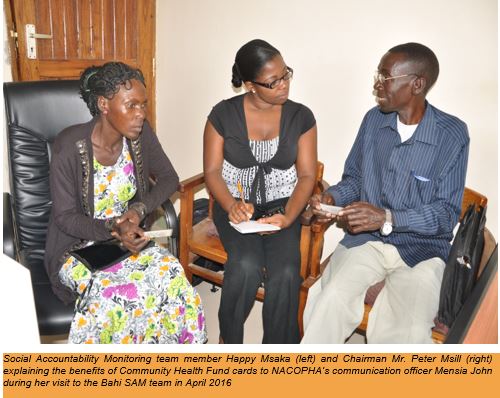Despite free antiretroviral (ARV) medication for people living with HIV (PLHIV) in Tanzania, poverty
prevents many PLHIV from being able to pay for medication to treat
opportunistic infections that frequently arise as a consequence of living with
HIV. The introduction of social accountability and monitoring (SAM) to
districts has helped to solve the problem by raising awareness of the issue,
which led to access to Community Health Fund (CHF) insurance to PLHIV in Bahi
district. The initiative spearheaded by the SAM team and the community development department of Bahi
District aims to benefit all PLHIV, especially those in the Bahi district
cluster.
National Council of People Living with HIV (NACOPHA),
under the United States Agency for
International Development (USAID) SAUTI YETU project, is strengthening Local Government
Authority’s (LGA) SAM to enable the authorities to analyse data collected from the relevant departments of the District Councils.
The purpose is to influence
decisions and processes at various levels in the community, local government,
or national authorities that impact the lives and rights of PLHIV in the nation
at large.
NACOPHA
facilitated a one week SAM training in October 2014 to representatives from PLHIV, Civil Society Organizations,
Councillors, the Council HIV/AIDS Coordinator and the Chairman of the Council Multi-sectoral
HIV Committee and religion leaders, which came together to make the SAM monitoring team for Bahi District Council PLHIV cluster. They were trained on methodologies of data collection
and analysis based on five social accountability stages and management of
documents produced from the process. Following the training, the SAM team
called a two-day meeting with heads of departments from LGA that highlighted
their responsibilities as officials.
Based on that training and meeting, participants better
understood their rights and LGA personnel better understand their
responsibility to involve society, especially SAM team who are representing the
entire society, in planning and budgeting. This is why Council HIV AIDS Coordinator (CHAC) under the Community Development Department involved PLHIV
in planning and budgeting in December 2015. SAM team leaders used that
opportunity to raise the issue of PLHIV not being able to pay for medication
for opportunistic infections and came up with a solution of helping them to have
CHF insurance. In January 2016 CHF cards were given to all PLHIV cluster
members.
According to CHAC, Mr. Joseph Kileo, the process was
influenced by SAM training which raised the understanding of their responsibility of involving representatives for
PLHIV in their plans and implementation of activities. Mr. Joseph Kileo said,
“I share the idea of inducing CHF insurance to PLHIV with the chairman of
NACOPHA’s District cluster who is also the chairman of SAM team. I wanted to
identify the needs and see where we can support.”
He added that the program started by supporting 261 PLHIV from Bahi
district cluster while the cards will be used regionally. The program is
expected to support more PLHIV with CHF insurance since many are joining the
district cluster in order to benefit from the program.
Mr Peter Msilili, chairman of NACOPHA’s District cluster and chairman of
SAM team, says that before CHF card there are were complaints since a majority
of PLHIV could not meet the expenses of drugs for opportunistic
infections which were being sold to them in health centers. “We are grateful for SAM training;
We had a very bad situation especially in obtaining health services, and
now through CHF we have no doubt” Mr. Msilili said.

Post a Comment